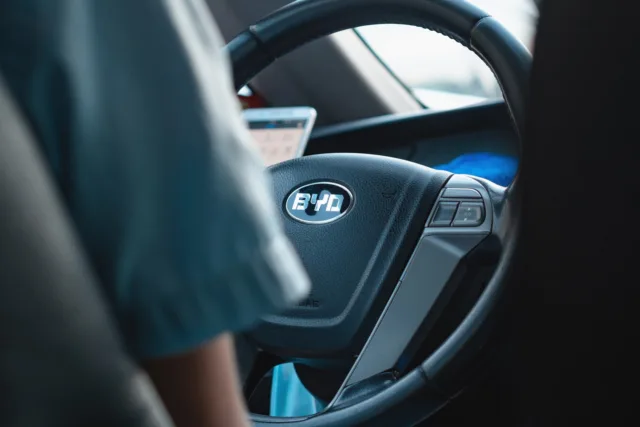
Chinese electric vehicle maker BYD has struggled to gain traction in Japan, selling just 1,861 vehicles in the domestic stronghold of competitors like Toyota Motor, Honda Motor, and Suzuki Motor in the first seven months of 2025.
But awareness of the Chinese brand is steadily increasing, according to sales associate Taisei Ichinose, who works at a BYD dealership in Yokohama, south of Tokyo.
“Previously most people asked, ‘What is BYD?’ or ‘Are Chinese EVs reliable?’” he said. “But we’ve already passed that stage … Now Japanese people recognize BYD.”
The Chinese company is betting it can chip away at barriers in Japan holding back performance relative to its home country and some Southeast Asian nations such as Thailand and Indonesia, where BYD is catching up with Japanese makers.
That confidence is reflected in a push to expand its network of dealerships by over half from 64 to 100 by the end of the year, ahead of the 2026 launch of its minicar, which will fall into a size category that accounts for more than 30% of Japan’s vehicle sales. The company is also strengthening its sales and maintenance structure.
Salespeople such as Ichinose welcome BYD’s planned minicar debut, even though details are so far sparse. It promises to ease parking worries that have put off otherwise enthusiastic customers, leading to some of Ichinose’s sales falling through at a late stage.
Several of BYD’s vehicles are too wide for mechanical multi-story parking lots that have 1.85-meter width restrictions, while even smaller models can be a struggle to squeeze into Japan’s tight parking spaces.
Even after addressing the parking issue with the minicar launch, BYD has other significant barriers to overcome in the Japanese market, where it accounts for just 1.3% of sales of total imported new passenger vehicles, according to the Japan Automobile Importers Association. Sales grew by 56.8% to 1,861 vehicles for the seven months to July this year, from the same period in the previous year.
BYD “has two walls … EVs and China[-made]”, said Ichinose from the BYD Auto Kohoku New Town in Yokohama, which is operated by new and used car dealer Accel.
Japan lags many other countries in its uptake of EVs. Their share of all sales was just 1.9% in July, far behind other markets including China with 54.8% and the US with 10.5% according to Tokyo-based automotive research firm MarkLines.
Japanese consumers’ high levels of trust in local manufacturers contrasts with a wariness towards Chinese brands. Ichinose said, “There is a bad impression of China-made [vehicles] in Japan.”
But drivers’ preconceptions can change if they try out BYD’s vehicles, he said. He related how a previously reluctant customer switched his purchase decision from a Volkswagen to a BYD in the wake of a test drive he described as “unbelievable.”
BYD Auto Kohoku New Town’s showroom sells as many as ten BYD vehicles a month. Its customers, mostly in their 30s and 40s, are mainly switching from Toyota and Nissan upon becoming satisfied by the price and cruising range of the Chinese company’s EVs.
BYD, which emphasizes lower prices than competitors, on Monday started offering limited-time vehicle discounts until the end of September in Japan. The offer, advertised on its website, applies to major models including the Dolphin, the Atto 3, the Sealion 7 and the Seal, with discounts of up to JPY 1.17 million (USD 7,953). The company estimates that when combined with other subsidies from local governments, the total reduction could exceed JPY 2 million (USD 13,594) depending on the model.
Approximately 80% of purchasers of BYD vehicles are Japanese citizens, while 20% are foreign nationals, including Chinese and Americans, said BYD Auto Japan president Atsuki Tofukuji in an interview with Nikkei Asia in May.
The typical customer for BYD’s Dolphin compact is in their 50s and 60s while the Seal sedan’s core buyers are in their 30s and 40s, said Tofukuji. Buyers of the Atto 3, an SUV, are generally in their 30s to 50s. Since entering Japan, BYD had sold 5,300 vehicles by June this year, with over half of sales made to buyers switching from domestic brands.
Around 95% of BYD dealerships in Japan already handle sales of other imported brands, said Tofukuji. Accel, for example, which opened BYD Auto Tomei Yokohama, the brand’s first Japan dealership, in northwestern Yokohama in 2023, also operates dealerships for Jeep, Volvo and other brands.
The number of companies wanting to open BYD dealerships increased after BYD’s minicar launch announcement, said Hiroshi Ikehata, a company spokesman.
Such dealerships expect EVs will become mainstream in the long term, said Tofukuji, “I think [dealers] want to gain a foothold towards the next generation. And they can be among the first to establish the sales network in Japan for the brand experiencing explosive growth in China.”
Establishing sales networks is important to promote brand trust and launch its kei minicars, Tofukuji said. He added that the company initially considered selling via e-commerce. Some competitors, such as Tesla and Hyundai Motor, have primarily focused on online sales, though Tesla is now aiming to shift its sales method from online to dealerships in Japan.
However, he said that dealerships were “a necessary investment for sales,” adding that, “for customers, the ability to visit, see, touch and test drive vehicles at a dealership showroom is extremely important when purchasing a car.”
Ichinose, the salesman, emphasized a similar point. He said, “Most Japanese people prefer to buy cars through a salesperson. I think Japan favors such a style over efficiency.”
This article first appeared on Nikkei Asia. It has been republished here as part of 36Kr’s ongoing partnership with Nikkei.









